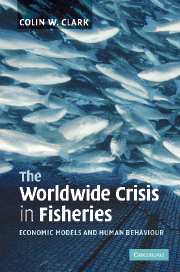Appendix
Published online by Cambridge University Press: 03 February 2010
Summary
This Appendix briefly considers some aspects of fisheries management that have not been fully discussed in the book. References are cited for additional information, but few of these topics have yet been studied in any detail, certainly not in a bioeconomic setting.
Stock Assessment
Techniques of stock assessment began changing rapidly around 1995 (see Hilborn et al. 1993; Punt and Hilborn 1997; McAllister and Kirkwood 1998; Parma 2001; Walters and Martell 2002; Quinn and Collie 2005). Contemporary stock assessment uses Bayesian methods (which are computationally intensive) to quantify the level of uncertainty in these estimates (see Chapter 5).
The opinion is sometimes encountered that, having failed in the past to forecast population collapses, stock assessment is no longer needed in fisheries management. I believe that this is a dangerous trend. Managers need to have up-to-date knowledge of the state of the stocks, as well as a realistic assessment of the degree of uncertainty pertaining to this information. The question of how uncertainties in stock assessment (and elsewhere) should be addressed by the decision makers was discussed in Chapters 5 and 7.
Simulation Models
The models used in this book are analytic models, that is, models that are written down in mathematical language, or specified graphically. Although analytic models are useful for obtaining insights about fisheries management, they are usually not appropriate for specific use, for example in setting or allocating actual annual quotas. The advantages of analytic models are simplicity, generality, transparency, and relative ease of solution or analysis.
- Type
- Chapter
- Information
- The Worldwide Crisis in FisheriesEconomic Models and Human Behavior, pp. 247 - 252Publisher: Cambridge University PressPrint publication year: 2007



